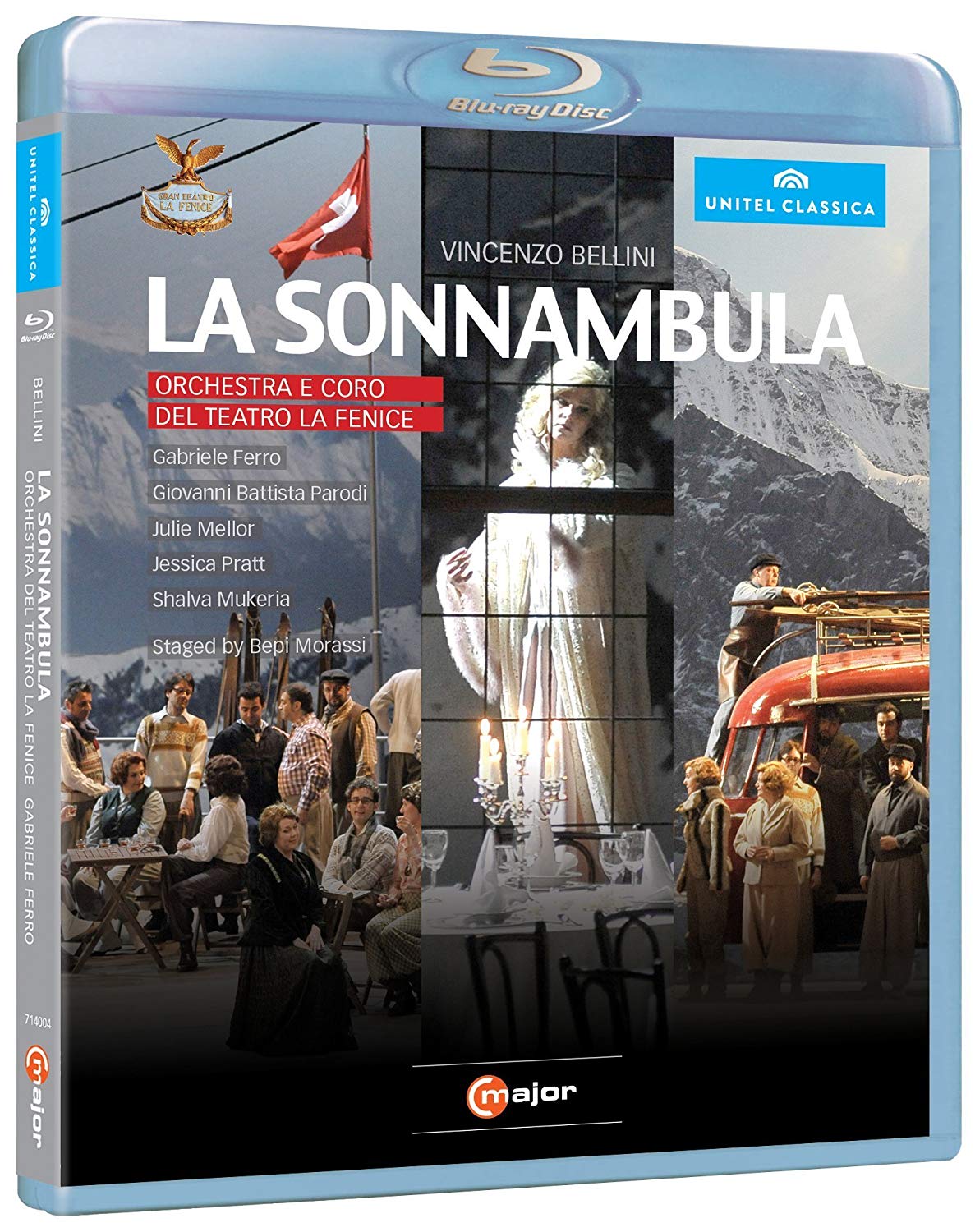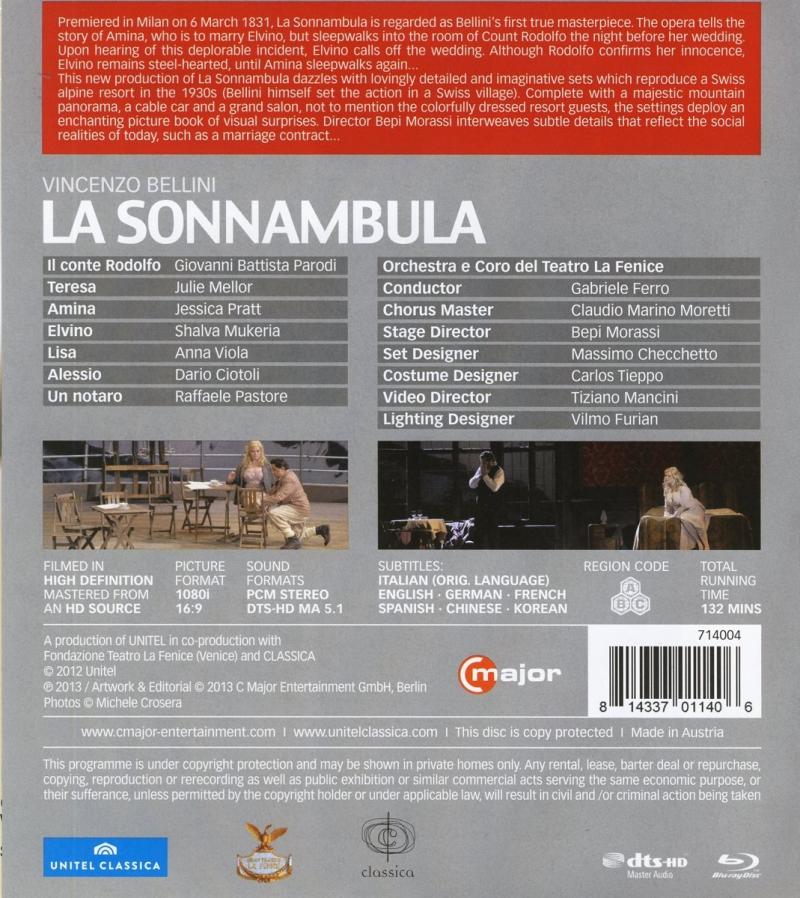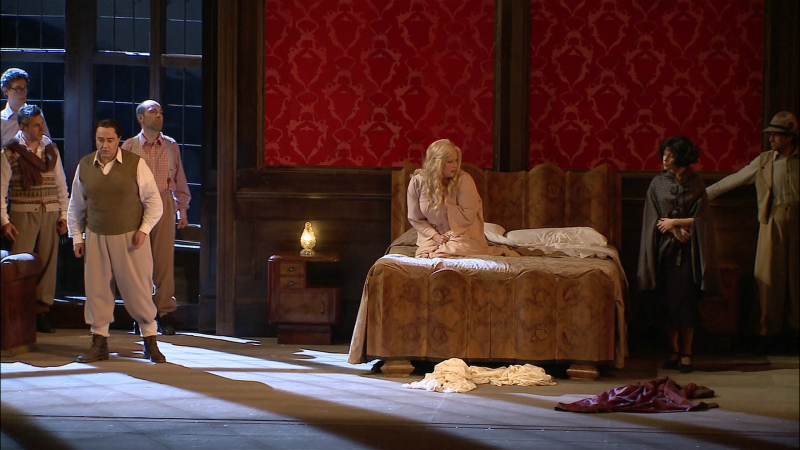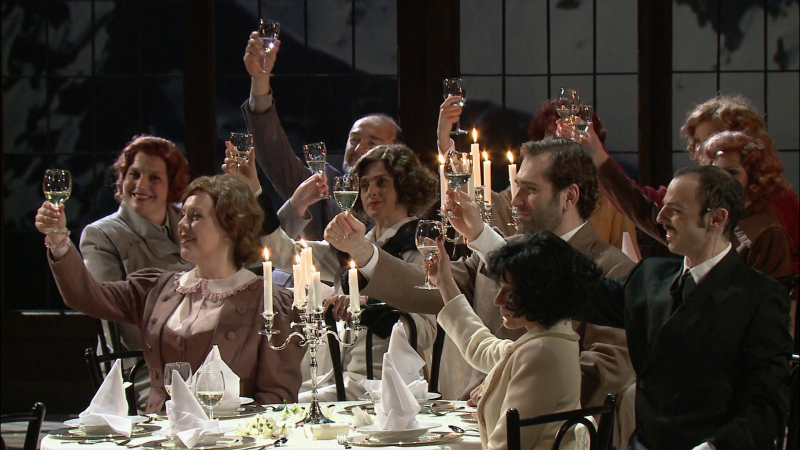

Bellini La Sonnambula opera to a libretto by Felice Romani. Directed 2012 by Bepi Morassi at the Teatro La Fenice. Stars Jessica Pratt (Amina), Shalva Mukeria (Elvino), Anna Viola (Lisa), Giovanni Battista Parodi (Count Rodolfo), Julie Mellor (Teresa), Dario Ciotoli (Alessio), and Raffaele Pastore (Notary). Gabriele Ferro conducts the Orchestra and Coro del Teatro La Fenice (Chorus Master Claudio Marino Moretti). Sets by Massimo Checchetto; costumes by Carlos Tieppo; lighting by Vilmo Furian Directed for TV by Tiziano Mancini. Sung in Italian. Released 2013, disc has 5.1 dts-HD Master Audio sound. Grade: A
When Bellini wrote this opera in 1831, the public was fascinated by sleepwalking. The opera was set in a sleepy alpine village where the inhabitants didn't know about the phenomenon. Amina, a young orphan lass, was a regular night walker. The villagers thought they were seeing a ghost, and nobody realized it was Amina. When Amina woke up at the wrong place at the wrong time, she found herself in big trouble. This was pretty far-fecthed even in 1831. Still, La Sonnambula was popular all over Europe, and it's still considered to be one of Bellini's greatest works (along with I Puritani and Norma).
In this production, director Morassi moves forward 100 years to 1931 and puts us at the small but chic Cavalli Resort Hotel in prosperous Switzerland. The villagers have gathered on the hotel observation deck (joined by some wealthy guests) for an informal party honoring the upcoming wedding of Amina (Jessica Platt). Amina is the blond in the center of the stage. Her foster mother, Teresa (Julie Mellor), is standing to Amina's right, and friends in local costumes are singing a song to Amina. To the left of Amina, you see Lisa (Anna Viola), the owner and operator of the hotel (standing and wearing a straight skirt). I just had to start off with a view of the entire impressively beautiful set:
Below you see a closer picture of Lisa declaring dismay at her situation. Lisa is a clever, successful, single businesswoman. She had hoped to marry Elvino, an older and wealthy farmer. But her dreams were shattered when Elvino fell in love with the younger (and poor) Amina. Now Lisa must cater the party in which her rival celebrates her victory over Lisa. Although Lisa is just a supporting role in this opera, Viola makes Lisa into the most interesting characters in the show. Perfectly cast and directed, Viola shows suburb acting ability in addition to her fine singing:
Lisa complains throughout the opera that she has no suitor. But this is wrong. Now we meet the ever gracious and warm-hearted Alessio, Lisa's main assistant at the hotel. Alessio desperately wants to marry Lisa. But the harder he presses her to accept him, the more she takes him for granted:
And now we have a close up of Amina and foster-mother Teresa clowning with friends:
But where is the groom? Well, he's late because he went to pray at his mother's tomb. Presently Elvino (Shalva Mukeria) arrives. Here he describes his prayer:
There's still one final main character to introduce: the stranger, who turns out to be Count Rodolfo (Giovanni Battista Parodi) the owner of a nearby empty castle. As the opera was performed in 1831, Count Rodolfo arrived incognito in a carriage pulled by horses. This is still in the libretto as you can see from the English translation in the subtitles below. But in our updated version, the stranger arrives via the hotel's cable car:
If you look closely, you can see the name on the cable car is "Cavalli Seilbahn." "Cavall" in Italian means "horses." "Seilbahn" in German means "funicular."
The stranger is soon revealed as the Count, who left the village as a small boy and was never heard from again. He is a compassionate and honorable man. But he has a weakness for women, who cheerfully throw themselves at him. It's late and he takes a room at Lisa's Cavalli Hotel. Lisa visits him to see if he is happy with his room. Lisa is not about to miss a chance for romance with the Count; and within 30 seconds, the Count is already disrobing her. (Look carefully at Lisa's blouse.) But before Lisa and the Count can carry on very far, they hear someone coming. Lisa hides. She and the Count are both astonished to see the Sonnambula!
That's right. Amina goes for a sleepwalk and out of all the places in the Alps to visit, she strolls through the Count's hotel room when Lisa happens to be there sans top! The ever opportunistic Lisa leaves the room (still sans top) to fetch Elvino. Count Rodolfo is tempted by Amina but, on reflection, passes on this opportunity. He picks up his bag and leaves the room, door open, with Amina sleeping there alone. Soon the villagers, all tipsy, arrive to sing welcome home songs to the Count. They enter the room through the open door and are convulsed in titillation when they see the form of a woman on the bed!
Soon Lisa and Elvino arrive as well as Amina's mom. Finally, Amina wakes and is rather baffled when she finds herself in a strange hotel bedroom with everybody in town accusing her of faithlessness:
Suddenly Lisa is back in control with Elvino:
This has got to be the most insane plot in all literature. But when accompanied by profuse strains of outrageous bel canto emotion, it all seems perfectly plausible. Poor Amina is devastated by rounds of recrimination. But Amina's mom keeps her head. Surveying the room, she finds Lisa's top. If you look carefully at the next screenshot, you see the top in a laundry bag stuffed under Teresa's arm as she and Amina flee the room:
The villagers condemned Amina in the hotel room. But later they feel sorry for her. They gather to visit the Count's castle in the Cavalli Castle Bus. They will demand that the Count either exonerate Amina or, if she has sinned, help her. The audience applauded this change of scene and the neat bus:
But in the meantime, all of Amina's wedding plans have been converted into a quicky wedding for Lisa and Elvino. Who can save Amina now?
Well, at the fancy dinner before the wedding, Count Rodolfo explains (with a medical textbook) to everyone about sleepwalking. He states on his honor that Amina is innocent:
And Teresa goes after Lisa asking what Lisa's top was doing in the hotel room. (In the original libretto, Lisa left behind a kerchief, not a blouse.)
Now Lisa is devastated and speechless. The villagers turn against her for framing Amina. But everybody gets a lesson in true love when Alessio alone shows compassion and stands by Lisa no matter what:
The villagers refuse to believe that Amina got to the Count's hotel room by sleepwalking. But suddenly the crowd sees the sleepwalking Amina moving down the ledge outside the windows. One false step and she will fall down the mountain:
Rodolfo goes out on the perilous ledge himself to bring Amina to safety:
After more bel canto settling of scores, Alessio joins Lisa at the head table as all drink to the wedding of Amina and Elvino. (I think they will make the world a safer place by having a double wedding with Lisa as the second bride):
This gimmicky plot is a bit of a hard sell to today's audience. Morassi's updating and his slick modern veneer neutralizes some of the sentimentality that must have been an important part of the La Sonnambula experience in 1831. But there is no hint of Regieteater in Morassi's direction and design—everything is done in a logical way and in the utmost of conservative good taste.
All the stars are fine at singing and acting. Platt is a bit chubby and Mukeria a bit avuncular for my taste, but together they make a plausible pair of April/September lovers. After seeing all the fun the splendid chorus has, I want to spend the rest of my life walking around singing instead of talking. The La Fenice orchestra sounds great under Ferro, who seems to be the world's leading Sonnambula conductor. You can see from the screenshots how beautifully this production is realized. Some of the screenshots suggest that the stage was too dark and many scenes seem to have the faces of the singers covered by shadows. But the production looks great in my home theater as captured by the effective Tiziano Mancini.
Patrick Dillon, a seasoned opera buff and expert on Bellini, reviewed this in the March 2014 Opera News at page 84. He was tougher on Shalva Mukeria than I had the nerve to be, calling him a "wooden actor with the look of a vaudeville comic." Dillon also states that the music for Elvino (Mukeria) and Lisa (Viola) has been simplified. He concludes that this recording as a CD would not be competitive. But he was still won over and gave a good recommendation because of the skillful directing, the beautiful sets, and Pratt's natural, winning performance as Amina.
My only reservation would be the lack of any star singers. But it's a highly enjoyable ensemble piece and excellent middle-of-the-road updating of an 1831 opera jewel. I'll give it an A grade and recommend it to anyone with the slightest interest in bel canto.
OR





















